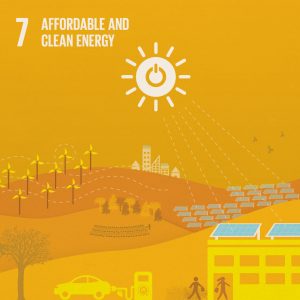By Chloe McMahon.
Rob Engle and Scott McClure both work as energy engineers for the Department of Facilities Management. The central concern of their work is to ensure that the university is using energy as efficiently as possible. Though this task may seem straightforward enough, they have found that maximizing energy efficiency means having a holistic knowledge about all the ways energy is expended in a dynamic and sprawling campus.
For instance, Engle and McClure have to manage the energy use of a variety of buildings, some of which are quite old and others which are more modern. McClure describes how this can add an additional challenge to their work, as some modern elements of energy efficiency are not possible in older buildings. However, they both added, even small changes such as adjusting thermostats and powering down computers can make a significant impact in any building.
Engle describes how Energy Management goes about targeting energy reduction in existing buildings. “Depending on what month it is, our [water] chillers are around 25% of the campus’s electricity bill. So, if you can go in there and save about 1-2% in electricity for those chillers and make them just a little more efficient, you will make a significant impact on campus electricity use.”
Engle lights up in describing how small tweaks in opportune locations can have massive impacts on energy use, citing this large-scale impact as part of his draw to this work. Through simple but strategic solutions, he believes that significant ground can be made towards electricity efficiency.
When it comes to modern buildings, the Department of Energy Management is actually involved in the design and construction process itself. They work alongside building and landscape architects in order to make choices for the design elements of the building that will allow energy to be conserved and effectively used in the building. Though using motion-activated lights and natural lights are two expected ways to conserve energy, McClure also pointed out that innovative water use is a tactic that has risen in popularity lately. For instance, while helping in the design of the new Advanced Structure Testing Lab (ASTL), the energy engineers suggested collecting rainwater for use. Now, ASTL uses rainwater to run its bathroom facilities.
One fascinating aspect of Energy Management’s work is their webpage that gives anybody open access to valuable data about energy use in every building on campus. This information is laid out clearly on performance graphs that chart how much electricity and water Auburn’s buildings use, as well as how much water they draw from Auburn’s chilled and hot water plants. Engle and Mcclure were excited to be a part of the development of this website, as this information used to not be so readily accessible to the public. Their hope is that, by making this energy consumption data available, students and faculty will begin to take an interest in how we use energy on campus.
Both Engle and McClure are Auburn alumni, and their love for Auburn University and the surrounding community is a big part of their work. Engle expressed how motivating it is to feel as if he can give back to the university that gave him an education, family, and a wealth of memories. Working on Auburn’s campus makes him feel that he can do good both for the university and the surrounding community. To this point, Engle says, “When we work to make sure nothing runs off into the creek, I think to myself ‘that’s the same creek my kids play in.’ I am very interested to make sure the things we do don’t negatively impact our neighborhoods.”
Mcclure feels similarly, stating that even as an employee, he feels very plugged into the Auburn family. “There is a certain amount of enjoyment I get, coming to work here and knowing I made a difference. Nobody else will even have any idea that we did it, but it help set [the campus] up for the next 25-50 years.”
McClure’s statement sums up the work of energy management well. Though their work is seldom recognized, they do the humble, steadfast labor that continually pushes Auburn to be a more efficient and sustainable campus.
Post Contributed by Chloe McMahon, Program Coordinator, Office of Sustainability
Learn about the SDGs & AU and our contributions related to this post.





